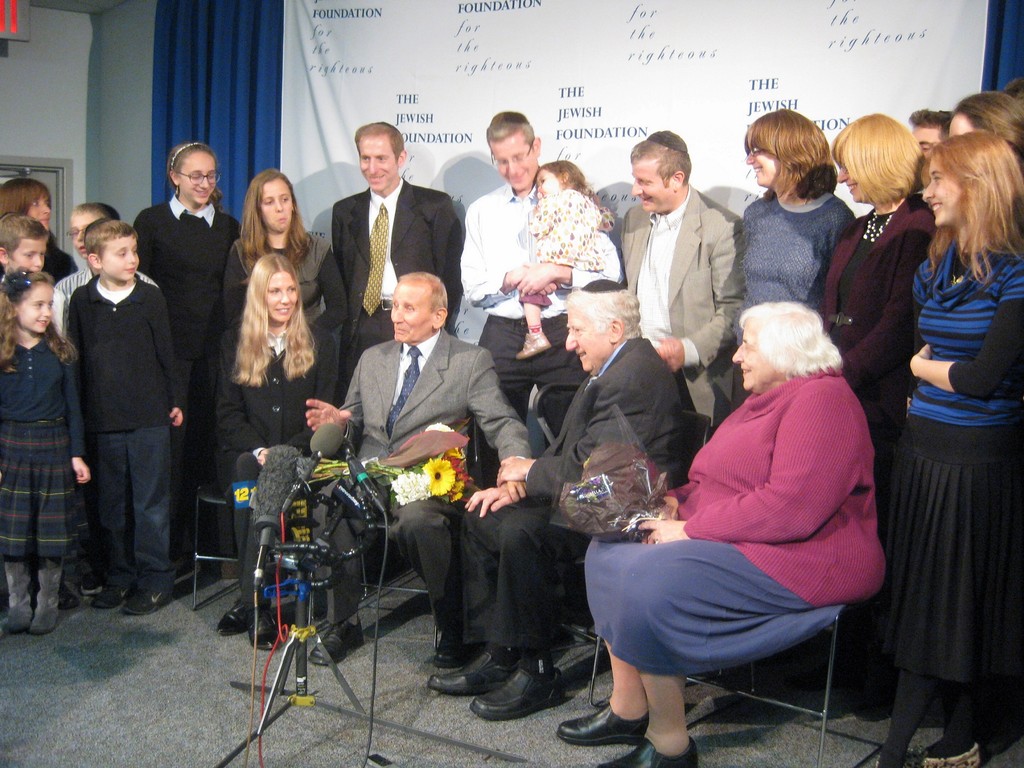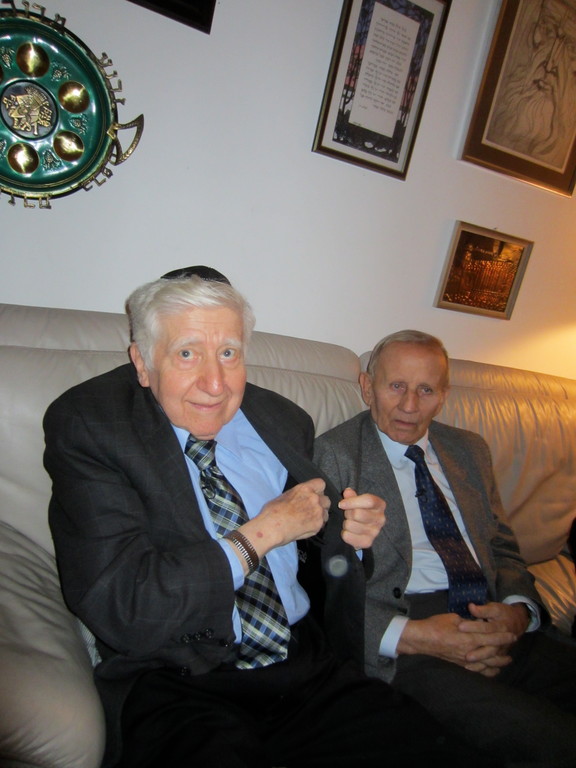Cedarhurst survivor meets savior
After 69 years, a Cedarhurst psychologist and Holocaust survivor was reunited this week with the son of the family who sheltered him and his family for two years during the Holocaust.
The men embraced as Polziec arrived at JFK Airport from Mielec, Poland, then travelled to the Gerstner home on Albermarle Road to light the menorah on the first night of Chanukah.
“When we were in hiding we couldn’t celebrate Chanukah,” Gerstner explained at the candle lighting. “This is an opportunity to celebrate together. We celebrate the victory over our enemies.”
They sat side by side on the sofa in the Gerstner living room, Gerstner speaking animatedly in flawless American English, Polziec speaking Polish, answering questions through a translator, occasionally saying an English phrase. They repeatedly reached out and grasped each other’s hands, and during the emotional conversation would at times hug, as family members and cameramen swirled around them.
“I am very happy to be here,” said Czeslaw. “I regret that it took so long to meet.”
Gerstner said that his grandparents had a farm in Poland and his mother was a peddler. They had some connection with the Polziec family in the town of Frysztak. “They must have taken pity on her,” he surmised.
In July 1942, a few days before most of the Jewish residents of the town were killed, they were taken in by the Polziecs, he said. Leon, then 8 years old, and his mother Frieda, and his aunt Celia, uncle Herman and cousin Moshe Wiesenfeld, hid in the attic of the Polziec home, where Maria and Stanislaw had five children.
Leon’s family moved between the attic and the barn and at times hid in the thick forest adjoining the home during Nazi searches. Leon recalled that the barn held two cows, a horse and a pig. Sometimes, when there was no danger of Nazi searches, they were able to enter the home and Leon and Czeslaw, then 9 years old, would be able to play together.
They also built a secret bunker and stored bales of grain above it.
The Gestapo suspected the Polziecs of hiding Jews and would come looking for them. Leon recalled that they came one time in the middle of the night and Leon and his family raced down the ladder and hid in the bunker.
The Polziecs pulled bales of wheat over the hiding place. Under the floor, they could hear the Nazis beating Stanislaw and hear the crying and yelling and the Nazis searching for them. Leon was terrified that he would inadvertently cough and give up their hiding place; that would have led to all their deaths, including the Polziecs.
He praised the Polziec children who kept quiet about the hidden Jews even as the Nazis beat their father.
“That was as close as we came to being caught,” he said. “We heard everything. I have bad memories of there,” he said, his cheerful, open face darkening. “This family helped us with the Gestapo and triumphed over their design to destroy every Jew. It is great to be able to express personally, to talk to someone who saved my life. It is a gift to me, he gave me my life. He saved five people. And thanks to him there are generations of children.”
“They were determined to kill every Jewish soul,” said Leon of the Nazis. “They found the time to search the forest to find one child to kill.” Leon’s family was ultimately liberated by the Russians and came to the U.S. after the war.
The two reunited men were feted around town with a Kiddush at the Young Israel of Lawrence Cedarhurst on Shabbat, a presentation at Rambam Mesivta’s Chanukah chagiga (celebration) on Tuesday morning and the Jewish Foundation for the Righteous Dinner at the Waldorf-Astoria Tuesday night.
Dr. Leon Gersten has lived in Cedarhurst for 40 years and davens at the Bais Medrash of Cedarhurst, the Shteibel, and his children attended, and now his grandchildren attend, Yeshiva Darchei Torah and the Torah Academy for Girls.
Leon had tried to track down the Polziecs starting in 1989, but was unsuccessful until he approached Yad Vashem who was able to find Czeslaw. The Jewish Foundation for the Righteous (JFR), an organization founded to assist non-Jews in need who rescued Jews during the Holocaust, facilitated the pre-Thanksgiving visit.
When asked why his parents hid a Jewish family, Czeslaw said, through the translator, “This was the decision of my parents. Our mothers knew each other.
“They were honest people living in the village. It was the right thing to do and that’s what they did.” Then he added, “Maybe others could have done it.”
“No, no,” rejoined Leon, and the two men hugged and kissed each other. “Nobody else. You were our last hope, thank G-d.”

 48.0°,
Overcast
48.0°,
Overcast 







